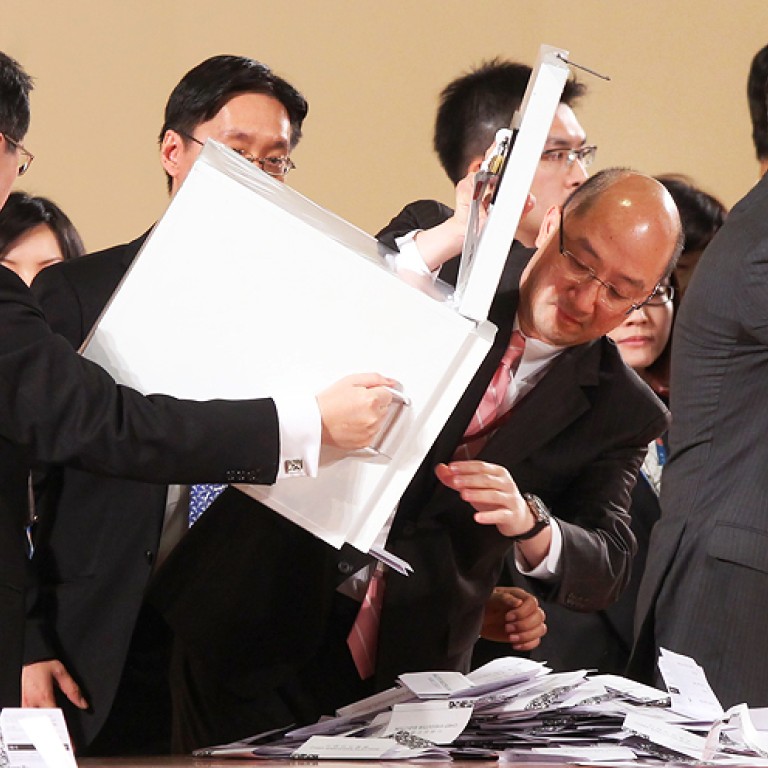
Hong Kong kingmakers? The 300 committee members with long history of voting for chief executives
As most Hongkongers wait for chance, we reveal the politicians, tycoons and religious leaders who have had a say in at least three elections
A quarter of the 1,200 people who got to vote for the city's leader in 2012 had held on to their roles for at least a decade, according to a study that indicated how likely it would be for others to join the nominating committee in future polls.
And most of those election veterans are delegates to the National People's Congress, Chinese People's Political Consultative Conference - loyalists appointed by Beijing - business tycoons and religious leaders.
They held either uncontested or ex-officio seats, making up 77 per cent of those who had voted in all four elections since 1996.
More openly representative sectors, by contrast, generally saw far fewer individuals clinging to power over a long time, the study showed.
"The NPC and CPPCC have formed the political core that exists to make Beijing feel safe," political pundit Dr James Sung Lap-kung said.
"The central authorities will make use of the [nominating committee in 2017] to continue to manipulate who can stand as candidates. In such a case, the chance of pan-democrats getting approval is zero."
The study focuses on the four bodies - known as the Selection Committee in 1996 and the Election Committee thereafter - that have picked the city's chief executive in all four elections up to 2012, since Tung Chee-hwa was chosen as the first post-colonial leader in 1996.
By the last poll, 78 committee members had voted all four times, while another 219 were choosing the chief executive for the third time.
The Election Committee is picked by 7 per cent of the city's 3.5 million registered voters. Membership is divided into four sectors, roughly comprising business, professionals, social and cultural services, and politicians. Each sector may have elected, uncontested and ex-officio seats.
Billionaires Li Ka-shing, Lee Shau-kee and Lui Che-woo are among the long-enfranchised business representatives.
The ex-officio members include NPC delegates and local lawmakers.
Political scientist Professor Ma Ngok, of Chinese University, said the fact that a significant number of people had enjoyed an unrivalled presence on the committees over time explained why the government was disinclined to make changes.
The importance of who gets a seat has arisen as the government proposes that, in 2017, a nominating committee modelled on the 2012 body will cross out up to eight hopefuls in an internal vote before putting forward two or three candidates for the public to choose from.
Members will be largely chosen by about 250,000 individual and corporate voters in dozens of subsectors.
The study found just four of those four-time veterans - representing the engineering, architecture, health services and accountancy sectors - won their seats on stronger mandates involving thousands of votes from individual members in their respective professions.
The biggest group among the four-time veterans is that of NPC deputies, who occupy ex-officio seats. There were 17 of them in 2012, including Rita Fan Hsu Lai-tai, Maria Tam Wai-chu and Cheng Yiu-tong. This category denotes the highest level of loyalty in the eyes of Beijing.
This group was followed by CPPCC delegates, with nine of them having voted since 1996.
For Ann Chiang Lai-wan, who served on all four committees before becoming a lawmaker, no cap should be placed on the number of terms of membership. She said: "Imagine if Li Ka-shing ceased to be on the committee - that'd be a matter of concern."
Over the years, the committees had changed in size, expanding the number of chief executive voters from 400 to 1,200.
Speaking to reporters yesterday, Chief Secretary Carrie Lam Cheng Yuet-ngor apparently sidestepped the suggestion of introducing more individual votes to reduce corporate influence on the committee. The idea could help the government garner support from pan-democrats for its electoral reform.
"The government's proposal today … is already a complete proposal," Lam said. "It is a legal and feasible proposal."

